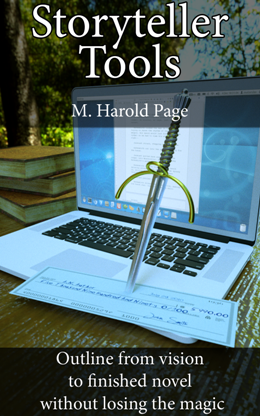Writing: Why You Shouldn’t Tinker With the Beginning Until You’ve Written to the End

The beginning of your novel is… Important. Vital. Critical.
It’s the bit that grabs the reader, and if the reader is your dream agent or an editor, then it can potentially grab you a career instead.
So, important, vital, critical. So much pressure to get it right. A nagging fear that it’s wrong.
And yet, you need to hone your beginning last. Here’s why…
The beginning is almost a mirror image of the end.
The beginning sets up the main conflicts and themes (bigger things the story’s about), the end closes the conflicts and illuminates the themes. The beginning asks one or more powerful questions. The end answers them.
The power of the end stems from what comes before: the head of steam, the tangle of plot spinning into a single compelling thread. You would not, therefore, attempt to finalize the end first.
I mean, yes, it’s possible you might sketch it, it might be the story seed that gets your writing; doomed emperor on a burning zeppelin, now backfill. However, you cannot really write the ending until you know what the story is. You find this out by writing the story.
Outliners like me, we write in layers. So my first outline gives me an ending, but the devil is in the details, so the story evolves with the telling. I don’t really know what the ending is until I’ve written actual prose right to the point where I hit enter and type The End. The same is obviously true of Pantsers.
In the process, I may add new characters that need to be retrofitted to the text, I may discover new things about the story world, the architecture, the choice of weapons. Characters may change gender or merge.
Now, if the power of the end stems from what comes before, the point of the beginning is what comes after. You can’t therefore finalize the beginning until you have the rest of the novel.
Just imagine you spent three days honing the perfect opening paragraph leading into the perfect scene, kicking off the perfect first chapter?
Then, three months later you come back and have to make the following changes…
…the tall male NCO called Geoff is now a buxom female NCO called Janice. The barracks are now a ruined farmhouse. The unit’s rail guns are now laser carbines. Their power armour is now light weight skin suits. The red second sun is now a blue dwarf. The tank is now a grav skimmer. The comedy alien in the unit has been deleted. The hero no longer has a girlfriend back home. He does, however, have a recently slain boyfriend…
Those three days were a total waste of time. You would have been better just drafting the opening chapter and moving on.
And that’s what you should do.
If the story changes, add notes in BLOCK CAPITALS, better yet, annotate the outline. But an imperfect beginning is not unfinished homework. Niether is anybody going to look at your novel until you show it to them. Let the next draft shield you while you write this one.
Type on!
M Harold Page (www.mharoldpage.com) is a Scottish-based writer and swordsman with several Historical Adventure books in print. His creative writing handbook, Storyteller Tools: Outline from vision to finished novel without losing the magic is available on Amazon. If you live near Edinburgh, Scotland, he would love to teach you how to fight in Medieval German Longsword style.
While I frequently remind aspiring writers of the musicals adage that you write the opening number last, I must note that you may never get to the end if the foundation isn’t strong enough.
Writers vary in that.
Absolutely! But the foundation isn’t the ornamentation…
‘…the tall male NCO called Geoff is now a buxom female NCO called Janice. The barracks are now a ruined farmhouse.’
Sounds like screenwriting!
That’s basically what happened to Lawrence Block’s amusing novel, The Burglar in the Closet, which became the not funny movie, Burglar.